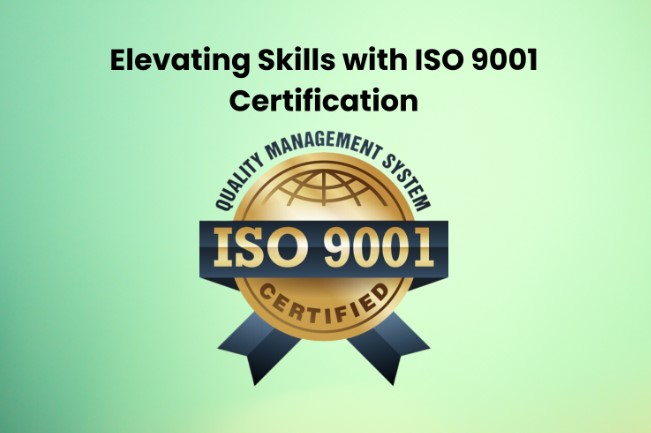The ISO 9001 standard is designed to assist businesses to satisfy the needs of the consumers and those of other relevant parties. It achieves this intention via following the guidelines and suggestions relating to the products and services of the company. ISO 9001 Training guarantees that someone completing the training may have the capabilities and expertise needed to set-up, operate, and ensure continual improvement of a quality management system (QMS) in line with the ISO requirements.
Therefore, understanding ISO 9001 Requirements is one of the necessities for every professional dealing with quality management in a company. It offers guidelines for attaining better processes, greater operational efficiency, and customer happiness.
What is the ISO 9001 Certification?
ISO 9001 certification indicates high-quality standards. It means an organisation follows quality principles in their work, products, and services. These key principles are customer focus, leadership, team effort, and process management. Certification ensures businesses work efficiently to meet or surpass customer expectations.
To get ISO 9001 certified, an organisation undergoes thorough evaluation. Their processes and systems are checked to ensure they align with certification requirements. It’s about establishing and continuously improving quality management system performance. This certification applies across industries and sectors, providing a framework for operational excellence.
The Benefits of ISO 9001 Certification
The benefits of obtaining the ISO 9001 Certification directly impacts the operational success of a company. Here’s a more defined look at these benefits:
- Enhanced Quality and Efficiency: The ISO 9001 standard demands that organisations define and implement high-quality processes. This improves efficiency and product quality. By focusing on quality management principles, companies can minimise errors, reduce waste, and streamline operations.
- Increased Customer Satisfaction: Adhering to ISO 9001’s customer-focused practices helps organisations better comprehend customer needs and expectations, in turn boosting satisfaction. It often results in repeat business and strong relationships with customers. Implementing these practices is beneficial.
- Market Differentiation and Competitive Advantage: Achieving ISO 9001 certification distinguishes an organisation. It demonstrates commitment to quality, appealing to customers who value excellence. This competitive edge opens new markets and enhances reputation. The certification is a testament to an organisation’s dedication.
- Improved Employee Engagement: The process method of ISO 9001 facilitates worker involvement and communication flow. Employees gain understanding of their roles in quality assurance and efficiency improvement. This leads to job satisfaction and productivity boosts.
- Regulatory Compliance: ISO 9001 assists organisations to ensure adherence with laws and regulations relevant to their operations. The systematic framework simplifies staying updated on, and following, industry-specific regulatory requirements. Thus, it decreases risks of penalties or legal troubles from non-compliance.
ISO 9001 Requirements
ISO 9001 always aims for constant improvement. This quality standard focuses on principles like customer satisfaction, effective leadership, staff commitment, process-driven systems, continuous enhancement, making choices based on facts, and nurturing relationships. Key requirements are:
- Understanding and meeting customer needs and expectations
- Establishing a vision and direction for the organisation’s quality management system
- Ensuring that everyone in the organisation is competent, empowered, and engaged in delivering quality
- Managing activities and related resources as processes to achieve desired outcomes efficiently
- Continually improving the organisation’s overall performance should be a permanent objective
- Making decisions based on analysing and evaluating data and information
- Managing relationships with interested parties to optimise performance
ISO 9001 Training
ISO 9001 Training is necessary for all of the employees inside the company who oversee quality management. The training covers the principles, ideas, and methods of QMS as prescribed by means of the ISO 9001 standard. The training courses include subjects starting from basic introduction to the standard for the newbie users, all the way to more advanced topics managing QMS implementation, auditing, and maintenance.
Implementation Strategies for ISO 9001
Implementing ISO 9001 needs a well-planned strategy. First, the top leaders must commit fully. Next, form a project group. Understand the current processes deeply. Find any gaps or issues. Make a detailed plan for implementing changes. Train all employees thoroughly. Document processes carefully. Conduct internal audits regularly. Constantly monitor, measure, analyse, and improve. These steps ensure compliance and boost the QMS’s effectiveness.
Conclusion
ISO 9001 certification is a quality standard helping organisation to improve. With ISO 9001 Training, people learn quality rules. Through comprehensive ISO 9001 Training, individuals and organisations gain a deeper understanding of quality management principles and practices, enabling them to meet ISO 9001 requirements successfully. Improving your skills with ISO 9001 certification is a strategic investment for your future. ISO 9001 certified experts help in promoting continuous improvement and fosters a culture of excellence that stands the test of time.

